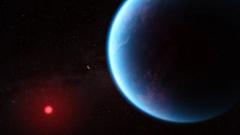In a groundbreaking moment for astronomers, signs of a gas typically produced by simple marine organisms have been detected on the exoplanet K2-18b. As scientists, led by Professor Nikku Madhusudhan from Cambridge University's Institute of Astronomy, approach the tantalizing possibility of confirming life beyond Earth, the implications for humanity's understanding of its place in the universe are immense. “This is basically as big as it gets in terms of fundamental questions,” says Madhusudhan, indicating that we might be close to answering whether we are alone in the cosmos.
For centuries, humanity has pondered the existence of other beings in the universe, fueled by speculative narratives and the exploration of our immediate planetary neighbors like Mars. However, recent evidence points towards distant worlds, with thousands of exoplanets identified since the first was discovered orbiting another star in 1992. While many of these planets exist outside the traditional "Goldilocks Zone" where life might survive, advancements in technology, including the James Webb Space Telescope (JWST), allow for a deeper analysis of the atmospheres of these distant worlds.
JWST's recent findings of the gas on K2-18b are only the beginning. The Habitable Worlds Observatory (HWO), slated for the 2030s, aims to target planets similar to our Earth and analyze their atmospheres with unprecedented resolution. The Extremely Large Telescope (ELT) will further lend insight into these distant bodies, ramping up the excitement around the prospects for discovery.
While optimism abounds, validation of these findings will not result in across-the-board affirmation of extraterrestrial life. Instead, it will incite rigorous scientific debate about whether these gas molecules originated from non-biological processes. Over time, as data mounts and researchers explore into various atmospheric signatures, a consensus may emerge suggesting life beyond Earth is plausible. “You won't know that it's definitely life. But as more data is collected, our confidence grows,” predicts Professor Catherine Heymans.
The slow exploration of our own solar system, coupled with missions aimed at investigating the icy moons of Jupiter and Saturn, will complement these efforts. As the European Space Agency's ExoMars and China's Tianwen-3 missions gear towards establishing potential signs of life on Mars, there is pervasive anticipation for discoveries that may reshape scientific paradigms.
The overarching question remains: What if simple life forms are found? While many scientists believe simple life should be relatively common, the leap from basic organisms to complex life—and intelligent beings—is still debated. Dr. Robert Massey from the Royal Astronomical Society emphasizes the complexities observed in Earth's evolution, arguing that each revelation about extraterrestrial life further diminishes the uniqueness of the human experience.
Ultimately, the detection of life elsewhere could not only provide insight into our own origins but could also foster a sense of connection among humankind. Professor Madhusudhan sees a transformative possibility where acknowledging our cosmic neighbors fosters unity, suggesting that “When we gaze at the stars, we will no longer see just celestial bodies; we will perceive a living cosmos, forever altering our understanding of ourselves.”
In a time where the dream of encountering intelligent alien life seems more feasible, scientists remain steadfast in their belief that unraveling the mysteries of the universe is no longer a distant endeavor. They anticipate a future filled with revelations, underscoring that understanding life beyond Earth may help us comprehend our own existence more fully.
For centuries, humanity has pondered the existence of other beings in the universe, fueled by speculative narratives and the exploration of our immediate planetary neighbors like Mars. However, recent evidence points towards distant worlds, with thousands of exoplanets identified since the first was discovered orbiting another star in 1992. While many of these planets exist outside the traditional "Goldilocks Zone" where life might survive, advancements in technology, including the James Webb Space Telescope (JWST), allow for a deeper analysis of the atmospheres of these distant worlds.
JWST's recent findings of the gas on K2-18b are only the beginning. The Habitable Worlds Observatory (HWO), slated for the 2030s, aims to target planets similar to our Earth and analyze their atmospheres with unprecedented resolution. The Extremely Large Telescope (ELT) will further lend insight into these distant bodies, ramping up the excitement around the prospects for discovery.
While optimism abounds, validation of these findings will not result in across-the-board affirmation of extraterrestrial life. Instead, it will incite rigorous scientific debate about whether these gas molecules originated from non-biological processes. Over time, as data mounts and researchers explore into various atmospheric signatures, a consensus may emerge suggesting life beyond Earth is plausible. “You won't know that it's definitely life. But as more data is collected, our confidence grows,” predicts Professor Catherine Heymans.
The slow exploration of our own solar system, coupled with missions aimed at investigating the icy moons of Jupiter and Saturn, will complement these efforts. As the European Space Agency's ExoMars and China's Tianwen-3 missions gear towards establishing potential signs of life on Mars, there is pervasive anticipation for discoveries that may reshape scientific paradigms.
The overarching question remains: What if simple life forms are found? While many scientists believe simple life should be relatively common, the leap from basic organisms to complex life—and intelligent beings—is still debated. Dr. Robert Massey from the Royal Astronomical Society emphasizes the complexities observed in Earth's evolution, arguing that each revelation about extraterrestrial life further diminishes the uniqueness of the human experience.
Ultimately, the detection of life elsewhere could not only provide insight into our own origins but could also foster a sense of connection among humankind. Professor Madhusudhan sees a transformative possibility where acknowledging our cosmic neighbors fosters unity, suggesting that “When we gaze at the stars, we will no longer see just celestial bodies; we will perceive a living cosmos, forever altering our understanding of ourselves.”
In a time where the dream of encountering intelligent alien life seems more feasible, scientists remain steadfast in their belief that unraveling the mysteries of the universe is no longer a distant endeavor. They anticipate a future filled with revelations, underscoring that understanding life beyond Earth may help us comprehend our own existence more fully.



















